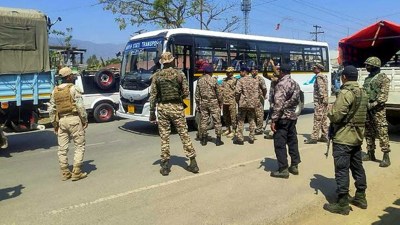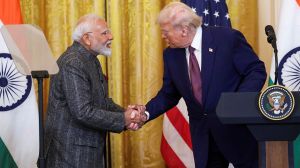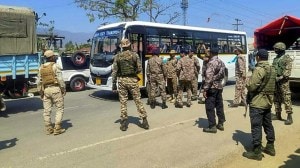The Indian Feckless Service
Ramakutty Maniyappan, a driver of the Border Roads Organisation who was killed by his abductors in Afghanistan, got all the state honours wh...

Ramakutty Maniyappan, a driver of the Border Roads Organisation who was killed by his abductors in Afghanistan, got all the state honours when his body arrived in the capital last week.
New Delhi8217;s salute to an ordinary worker who died in harness far away from home, however, can hardly mask the growing pusillanimity of India8217;s babudom. As more Maniyappans come under fire in Afghanistan, one simple fact stands out. There are no volunteers from the Indian Foreign Service to join the rough and tumble in Afghanistan. Only promotees on the verge of retirement can be dragged in, kicking and screaming.
While Pakistan8217;s ISI raises the bogey of a threat from the Indian presence in Afghanistan 8212; which appears to be the reason for the killing of Maniyappan 8212; the reality is rather different. Indian civil servants are too afraid to step into the political minefields in Afghanistan or elsewhere in defence of India8217;s interests.
The IFS, however, is not an exception. The situation is not very different in the Indian Police Service that dominates the intelligence agencies. Few from the agencies are willing to risk engaging these regions let alone being posted there. It is much worse in the Indian Administrative Service, with many of its officers having refused to take charge of their posts in states like Manipur where the writ of the Indian state is under threat.
While the armed forces are a little better, the preferred 8220;foreign postings8221; are not in the neighbourhood but in UN peacekeeping and western capitals. How have we come to this pass?
The Indian Foreign Service has a grand legacy of more than two hundred years, thanks to its origins under the British Raj. As the East India Company sought to conduct the necessary 8220;secret and political8221; business of establishing its hold and sustaining it in new territories, the Indian Foreign Department was established in 1783.
The department had two distinct functions in its diplomatic activity 8212; dealing with the 8220;foreign8221; or European powers who were competing with Britain and the 8220;political8221; one of dealing with the princely states and the Asiatic powers in the region.
As was to be expected, it was the political wing that dealt with the more exciting imperatives of Calcutta8217;s relentless expansionism. The hair-raising tales of these great adventurers from the Company and later the Crown are still the stuff of endurance, commitment and diplomatic skill.
From Bokhara Burnes to Lhasa8217;s Younghusband, British Indian officers opened up spaces all around the subcontinent. Many of them turned out to be great scholars of the regions they explored and administered. Some of them lost their lives in pursuit of Calcutta8217;s interests.
As the bureaucracy expanded and settled into the routine of careerism and opportunism after Independence 8212; much like the rest of the nation 8212; the spirit of adventure and the courage to serve against great odds rapidly evaporated.
The logic of early Indian diplomacy 8212; non-alignment and third worldism 8212; did not demand from the IFS more than good draftsmanship and the capacity to harangue the rest of the world in English. Indian diplomacy soon got identified with the unfair caricature that it is 8220;80 per cent alcohol and 20 per cent protocol8221;. More fundamentally, in the dual legacy that the IFS inherited, the attractions of the 8220;foreign8221; prevailed over the 8220;political8221; in the region.
This, indeed, is part of larger malaise in the nation. How many of us consider traveling to Nepal or Myanmar as 8220;going abroad8221;?
Barring the occasional political crisis management or military intervention in the neighbourhood, Indian diplomats were rarely tested for their capacity to handle complex ground situations or take any personal risk. With the exception of a few officers who revel in being pro-consuls in the neighbourhood, the general preference in the IFS has been for salubrious western capitals.
But as India emerges as a great power and pursues a new range of interests in the region and the world, its diplomatic operations will be tested less in Washington, Moscow and Beijing. While traditional high diplomacy will remain important, India has its diplomatic work cut out in its missions at Jalalabad Afghanistan, Birganj Nepal, Mandalay Myanmar, Zahedan Iran, Dushanbe Tajikistan, Khartoum Sudan and Caracas Venezuela.
Whether it is the search for energy resources in Africa and Latin America or staying in effective competition with China and Pakistan in our own region or preventing new threats to Indian primacy in the neighbourhood, these cities should be 8220;sexier8221; places to work.
But how does one make these places attractive to the babus? Exhortation to patriotic values is unlikely to work. The first among the alternatives is a better structure of financial incentives and perks.
Despite the significant increase in the pay scales of Indian diplomats working in neighbouring countries, the overall package remains less than inviting. Among the extra-benefits on offer should be housing and educational facilities for family and children in the capital, high life insurance, rest and recreation, and more frequent home leave.
The second is to ensure that those who take risks will be rewarded in their careers. The current promotion policies offer no benefits to those who take risks and no punishment to those who refuse to take responsibilities. Irrespective of what you do, every under secretary has a reasonable chance of becoming an ambassador and secretary to the Government of India. Heading small missions in sensitive areas must become an important criterion for future promotions.
The third is to recreate the Indian Frontier Service that once managed India8217;s borderlands. Finally, the time has come to open mid-career recruitment into the diplomatic service and the agencies to young men and women who have the aptitude for risky business. The prospect of bringing outsiders might force the now smug services to rethink the relationship between risk and reward in their career planning.
Delhi can dream on about replaying the 8220;great game8221; in Afghanistan. No Indian grand strategy in Afghanistan can survive with Maniyappans as cannon fodder. Unless the Indian bureaucratic elite leads from the front in areas that threaten life and limb, Delhi can forget its ambitions for a larger role in world affairs. There can be no great power status for India without some firm boots on the ground.
- 01
- 02
- 03
- 04
- 05































